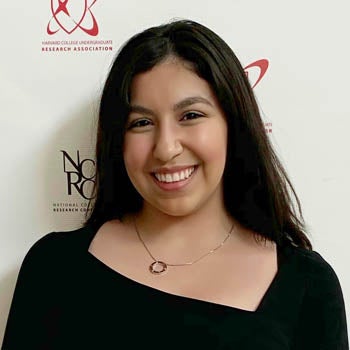Major: Biochemistry and Cell Biology
Research Advisor: Tiphanie Vogel, Center for Human Immunobiology at Texas Children’s Hospital
Junior Isabella Osuna chose her Biochemistry and Cell Biology major because she wanted to develop the knowledge and skillset she will need for a career in research, and during her time at Rice, she has taken full advantage of the research opportunities available to her.
“As a biochemistry major, I have the freedom to explore research opportunities with faculty at Rice and beyond the hedges in the Texas Medical Center,” said Osuna. “Rice not only promotes research but also supports the undergraduate researchers both on and off campus.”
As an underclassman, Osuna participated in Sustained Excellence in Research (SER) Scholars, a program that provides talented students from groups traditionally underrepresented in STEM with research mentorship, a stipend for their investigations, and a strong community of other SER Scholars. This year, she was accepted into the Rice Undergraduate Scholars Program (RUSP), through which students interested in research careers receive funding for independent research and for travel to conferences, assistance with post-graduate program applications, and training in topics like scientific communication and presentation skills.
The RUSP travel stipend empowered Osuna to share her research across the nation without financial hardship. This year, Osuna was one of 12 undergraduates invited to serve as plenary speaker at the National Collegiate Research Conference at Harvard University, where she presented her project on a rare autoimmune disease. “Throughout the three day conference, I was engaged and inspired by some of the world’s most distinguished scholars, policy makers, and educators, who served as our keynote speakers,” she said. “After the conference, I left Boston with not only a new outlook on my research but also a network of friends throughout the nation. Through my participation in the conference, I found a new level of confidence and excitement by presenting my research in a variety of different platforms and roles such as a conversationalist, a poster presenter, and as a plenary speaker.”
Additionally, Osuna was selected to share a poster on the same research at “Posters on the Hill,” traditionally held in Washington, D.C. (although this year it will take place remotely). At this conference, hosted by The Council on Undergraduate Research, student researchers present their work to members of Congress.
Osuna conducts research in the laboratory of Tiphanie Vogel at the Center for Human Immunobiology at Texas Children’s Hospital. Researchers in the Vogel lab study rare genetic diseases both to advance treatment for individuals suffering from these diseases and to develop our understanding of the signaling pathways that play a critical role in autoimmune disease and human health.
More specifically, Osuna investigates a disease called STAT3 gain-of-function (GOF). As in any autoimmune disease, in STAT3 GOF, the body attacks its own tissues and organs. STAT3 GOF is caused by hyperactivity of the transcription factor STAT3 and can result in lymph node enlargement, abnormally low levels of various types of blood cells, eczema, arthritis, and a variety of other conditions. Osuna tests different compounds on cell samples from STAT3 GOF patients to see if they effectively treat this disease.
“In addition to benchwork, I have the unique opportunity to study STAT3 GOF further in the clinic, where I have been able to examine and interact with these patients,” Osuna said. Her connection with the patients from which she obtains her cell samples motivates her to persevere through any challenges she faces in the lab. “Each week, I am able to see how our work impacts the health of our patients. This combination of bench research and bedside care sparked my passion which led to the development of my second research project focused on a rare immune disease, COPA syndrome,” she explained.
Osuna further developed her passion for personal patient care through an organization called Volunteers Around the World (VAW). The Rice Chapter of VAW works closely with the national VAW non-governmental organization to address health disparities in the developing world. Rice VAW members help bring medical treatment and education, nutritional security, and more to rural communities in developing nations. “Through Volunteers Around the World, I have traveled to Peru and Guatemala to set up mobile clinics in rural areas of the two countries,” said Osuna. “As part of the program, I was able to shadow a gynecologist and prepare and screen samples to test for cervical cancer.”
After graduation, Osuna plans to continue serving her community and satisfying her curiosity by earning her M.D. and pursuing a career in research and medicine.

